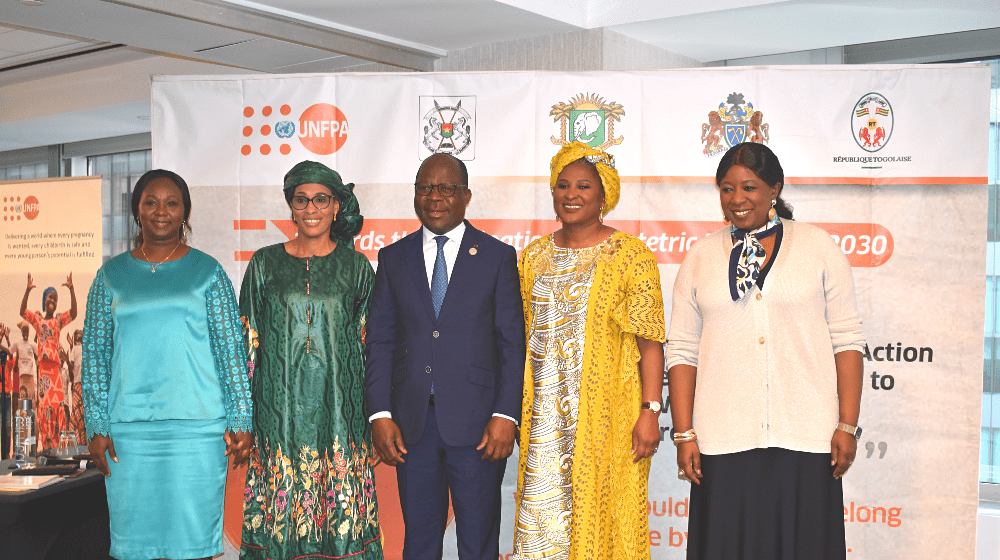New York, 20 September 2022. The United Nations Population Fund, in keeping with the theme of the 77th United Nations General Assembly, "A Decisive Moment: Transformative Solutions to Interconnected Crises ", in partnership with the governments of Burkina Faso, Côte d'Ivoire, The Gambia and Togo, are organizing a side event to launch a global call for action to scale-up efforts to eliminate obstetric fistula in West and Central Africa by 2030. The hybrid event will take place on Friday, 23 September 2022, in New York, from 10:30 to 14h00, (14h00 - 18h00 GMT) under the distinguished patronage of the President of the Republic of Togo.
The event brings together the First Ladies of Côte d'Ivoire and The Gambia, the Ministers of Health and Gender, Family and Children from Burkina, Côte d'Ivoire, Gambia and of Togo, Representatives of Permanent Missions and Development Partners (KOICA, WAHO, ECOWAS, Embassies etc.). Achieving Zero Obstetric Fistula by 2030 will require concerted efforts from governments, development partners, regional bodies, women and youth organizations, the private sector, community leaders and ordinary citizens to raise awareness and invest in the elimination of obstetric fistula. The objective of this side event is to build and strengthen partnerships among these key stakeholders, increase commitment and mobilize resources to address obstetric fistula in West Africa.
This high-level side event will build on the regional conference on obstetric fistula held in Abidjan, Côte d'Ivoire, from September 13-15, 2022.
While obstetric fistula has been virtually eliminated in developed countries, women and girls in developing countries still face this debilitating condition. This is especially true in the West and Central Africa region, which accounts for more than half of the world's two million fistula cases, but still has catastrophic rates of fistula repair. In 2018, only 2,281 women received treatment for fistula across the region, signaling that unless efforts to address the condition are accelerated, it will take centuries to end fistula in West Africa and the Center.
Country profile
In Burkina Faso, the security crisis has affected the access of women and girls to emergency obstetric and neonatal care. The prevalence of fistula was estimated at around 16,000 cases in 2019 but is increasing due to the closure of health centers(192 closed and 339 operating at a minimum as of June 30, 2022 (CONASUR), population displacements increase maternal and neonatal mortality in localities that already recorded the lowest sexual and reproductive health indicators in the country following the global campaign to eradicate obstetric fistula launched by UNFPA in 2003, more than 4,000 Burkinabè women suffering from obstetric fistulas were operated on.
In Côte d'Ivoire, high rates of obstetric fistula have been one of the disastrous but neglected consequences of insecurity and crisis. The 2002 civil conflict led to an increase in gender-based violence and harmful practices, and hampered access to timely and quality childbirth care, leading to increased rates of OF. Like other countries, Côte d'Ivoire is challenged to collect accurate data on the problem. According to the 2016 MISC, the prevalence of Obstetric Fistula is approximately 0.07% of women of reproductive age, or 44,602 women living with a fistula in 2020. However, the quality and collection and analysis of data need to be significantly improved, and these figures are considered to be underestimated.
In The Gambia, the burden of obstetric fistula is estimated at between 335 and, 1052 cases using maternal and perinatal mortality rates as well as fistula treatment data. These figures, although apparently low, do not reflect reality, since many more women are living silently with the disease. The Gambia faces many challenges in the fight against fistula, such as the absence of a national strategy to end Obstetric Fistula, very few doctors to perform Obstetric Fistula surgeries, inadequate treatment centers and ill-equipped and a serious lack of awareness of the state of the population.
Togo, like other countries in West and Central Africa, has a high rate of obstetric fistula. The exact prevalence has been difficult to determine, with estimated rates ranging from 1,200 to 1,500 cases according to Johns Hopkins University, to a prevalence of 1% in women of childbearing age, or about 18,500 cases according to the 2013 National Demographic and Health Survey. The country is currently implementing its second strategic plan for the elimination of fistula and has a national law on reproductive health providing free fistula treatment.
Media Contacts
Jacob Enoh Eben | Regional Communications Advisor | UNFPA WCARO | Phone: +221 77 450 4780; +221 77 3586662 | Email: eben@unfpa.org
DAKICHE Dedevi Simoni | Communications Specialist | UNFPA Togo | Phone: +228 22 53 90 28 | Email: dakiche@unfpa.org
Faith Ememodo | Communications Associate | UNFPA The Gambia| Phone: +220 310 95 15| Email: ememodo@unfpa.org


